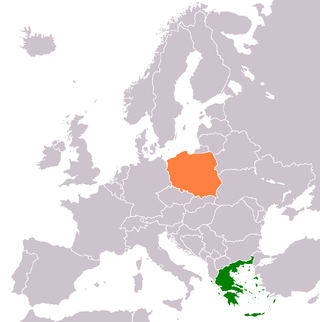
Zgorzelec is a town in southwestern Poland with 30,374 inhabitants (2019). It lies in Lower Silesian Voivodeship. It is the seat of Zgorzelec County and of Gmina Zgorzelec. Zgorzelec is located on the Lusatian Neisse river, on the Polish-German border adjoining the German town of Görlitz, of which it constituted the eastern part up to 1945.

Pruszcz Gdański is a town in Pomerania, northern Poland with 26,834 inhabitants (2010). Pruszcz Gdański is an industrial town neighbouring Gdańsk, part of the Tricity agglomeration. The Tricity Bypass begins in Pruszcz Gdański.

Bardo is a historical town in Ząbkowice Śląskie County, Lower Silesian Voivodeship, in south-western Poland. It is the seat of the administrative district (gmina) called Gmina Bardo.

Dziwnów is a town in north-western Poland situated on the Baltic Sea at the mouth of the river Dziwna which divides it into the right-bank part containing the center of the town, belonging to historical Farther Pomerania, while the left-bank part is located in Western Pomerania, with both parts connected through a bascule bridge. It is a part and the seat of the eponymous Dziwnów municipality within Kamień County, West Pomeranian Voivodeship. As of December 2021, the town has a population of 2,595.
The Lithuanian minority in Poland consists of 8,000 people living chiefly in the Podlaskie Voivodeship, in the north-eastern part of Poland. The Lithuanian embassy in Poland notes that there are about 15,000 people in Poland of Lithuanian ancestry.

Fablok is a Polish manufacturer of locomotives, based in Chrzanów. Until 1947 the official name was First Factory of Locomotives in Poland Ltd., Fablok being a widely used syllabic abbreviation of Fabryka Lokomotyw, among others as the company's telegraphic address. It is now named "BUMAR - FABLOK S.A. (corporation)". Fablok is located in the town of Chrzanów in Lesser Poland. As of 2009, Fablok no longer builds new locomotives.

Ukrainians in Poland have various legal statuses: ethnic minority, temporary and permanent residents, and refugees. According to the Polish census of 2011, the Ukrainian minority in Poland was composed of approximately 51,000 people. Some 38,000 respondents named Ukrainian as their first identity, 13,000 as their second identity, and 21,000 declared Ukrainian identity jointly with Polish nationality. However, these numbers have changed since the mid-2010s, with a large influx of economic immigrants and students from Ukraine to Poland, with some estimating their total number at 2 million people. Their status has been regulated according to the Polish and European Union (EU) policies of temporary work permits, temporary residence permits and permanent residence permits. The number of Ukrainians in Poland rose dramatically following the Russian invasion of Ukraine on 24 February 2022. By 16 August 2022, more than 11.2 million Ukrainian refugees left the territory of Ukraine, of which more than 5.4 million people fled to neighbouring Poland.

Greek-Polish relations are relations between Greece and Poland. Both countries are full members of NATO, the European Union, Three Seas Initiative, OECD, OSCE, the Council of Europe and the World Trade Organization. There are circa 4,000 people of Greek descent living in Poland, and over 20,000 people of Polish descent living in Greece. Greece has given full support to Poland's membership in the European Union and NATO.
Following centuries of relative ethnic diversity, the population of modern Poland has become nearly completely ethnically homogeneous Polish as a result of the altered borders as well as both the Nazi German and Soviet Russian or Polish Communist campaigns of genocide, expulsion and deportation during and after World War II in the country. Nevertheless, various ethnic minorities of various origin remain in Poland today, including some newly arrived or grown in size in recent decades.

Gołotczyzna is a village in the administrative district of Gmina Sońsk, within Ciechanów County, Masovian Voivodeship, in east-central Poland. It lies approximately 3 kilometres (2 mi) west of Sońsk, 10 km (6 mi) south of Ciechanów, and 67 km (42 mi) north of Warsaw.

Orło is a village in the administrative district of Gmina Małkinia Górna, within Ostrów Mazowiecka County, Masovian Voivodeship, in east-central Poland. It lies approximately 8 kilometres (5 mi) north-west of Małkinia Górna, 8 km (5 mi) south-east of Ostrów Mazowiecka, and 90 km (56 mi) north-east of Warsaw.
Gniazdowo is a village in the administrative district of Gmina Stary Lubotyń, within Ostrów Mazowiecka County, Masovian Voivodeship, in east-central Poland. It lies approximately 4 kilometres (2 mi) west of Stary Lubotyń, 15 km (9 mi) north of Ostrów Mazowiecka, and 100 km (62 mi) north-east of Warsaw.

Polish–Romanian relations are foreign relations between Poland and Romania.

Celiny is a village in the administrative district of Gmina Ożarowice, within Tarnowskie Góry County, Silesian Voivodeship, in southern Poland. It lies approximately 4 kilometres (2 mi) south of Ożarowice, 14 km (9 mi) east of Tarnowskie Góry, and 21 km (13 mi) north of the regional capital Katowice.

Bielsko-Biała is a city in southern Poland created after the merging of two closely situated cities, Bielsko and Biała, in 1951. As separate entities, the cities have a lengthy history.

Macedonians of Poland form a small minority of the country primarily concentrated in Southern and Central Poland. Most of the Macedonians of Poland originate from the child refugees of the Greek Civil War. Estimates put the number of Macedonian refugees settled in Poland at 11,458. Many Macedonians immigrated to Poland after the Breakup of Yugoslavia.

Andrew Rossos is a Canadian-Macedonian Professor Emeritus of History at the University of Toronto.

The German Minority Electoral Committee is an electoral committee in Poland which represents the German minority. Since 2008, its representative has been Ryszard Galla. In the 2023 Polish parliamentary election, Galla lost his seat in the Sejm, leaving the party with no national representation.
Józef Ciągwa, slov. Jozef Čongva – Polish lawyer of Slovak origin, translator, lecturer at University of Silesia in Katowice, professor of jurisprudence and president of the management board of Slovaks in Poland Association.

















